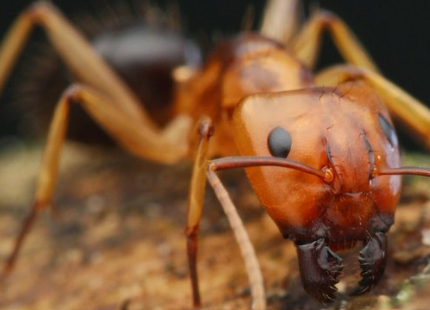The animal kingdom just got even more interesting to even those not interested in science.
In a remarkable display of interspecies medical intervention, Florida carpenter ants (Camponotus floridanus) have been observed performing life-saving treatments on their injured colony members, showcasing behaviors akin to surgical procedures. This discovery places them alongside humans as the only species known to systematically and intentionally amputate limbs to save lives, based on findings published in the journal Current Biology.
Led by Erik Frank, a behavioral ecologist from the University of Würzburg in Germany, the research team studied how these ants manage wounds within their colony, particularly focusing on two types of leg injuries: those on the femur (thigh) and on the tibia (lower leg). Their observations revealed that ants respond differently depending on the location and severity of the injury.
Ants perform specialized medical surgeries on injured friends: Florida carpenter ants treat injured mates by cleaning wounds or performing amputations. Study suggest the method depends on the injury type. https://t.co/OHi7lU6eaE #EarthDotCom #EarthSnap #Earth pic.twitter.com/YYvSchN4FU
— Earth.com (@EarthDotCom) July 3, 2024
When a femur wound is detected, ants were seen cleaning the area thoroughly with their mouths before proceeding to amputate the injured limb through repeated biting. This process, which can take upwards of 40 minutes, significantly improved the survival rates of the injured ants, boosting it from less than 40% to between 90 and 95%. In contrast, tibia wounds, which involve less muscular tissue and thus a faster spread of potential infections, were only cleaned and not amputated. Cleaning these injuries increased survival from 15% to 75%.
The decision to amputate or clean seems to hinge on the ants’ ability to gauge the speed at which an infection might spread. The more muscular femur, when injured, could slow blood circulation enough to delay widespread infection, providing the ants sufficient time to perform an amputation. The tibia, with less muscle mass, presents a higher risk of rapid infection spread, making immediate cleaning the more viable option.
“Ant surgeons: Florida carpenter ants perform life-saving amputations – The Hindu BusinessLine” https://t.co/A599ut54d9
— Dr. Amit Chaudhery (@powerofmouse) July 3, 2024
This intricate understanding of wound management parallels human medical systems in complexity and efficiency, as ants assess and treat injuries with a precision that mitigates the spread of infection and enhances survival chances. Interestingly, the researchers noted that these behaviors appear to be innate rather than learned, suggesting a hardwired natural instinct for medical intervention among Florida carpenter ants.
The implications of this study extend beyond just the fascinating behaviors of carpenter ants, as the research team plans to explore these surgical skills in other ant species without specialized antimicrobial glands, potentially broadening our understanding of medical behaviors in the animal kingdom.
Key Points:
i. Florida carpenter ants perform life-saving ‘surgeries’ on injured colony members, distinguishing them as one of the only species, alongside humans, known to amputate systematically.
ii. The ants treat severe femur injuries by amputation and less severe tibia injuries by cleaning, with techniques improving survival rates significantly.
iii. The decision between amputation and cleaning depends on the injury’s location and the potential speed of infection.
iv. These behaviors, which involve diagnosing and treating wounds, are compared by researchers to human medical practices due to their complexity and effectiveness.
v. The study suggests these medical behaviors are innate, leading to further research into whether other ant species exhibit similar capabilities.
Kirk Volo – Reprinted with permission of Whatfinger News



